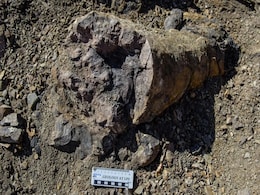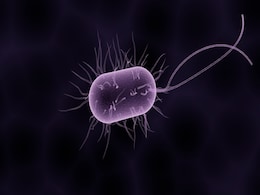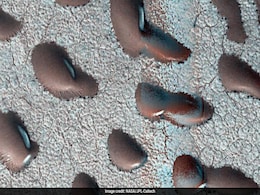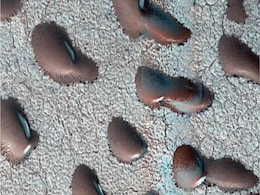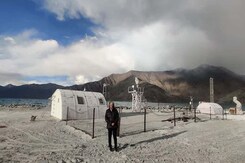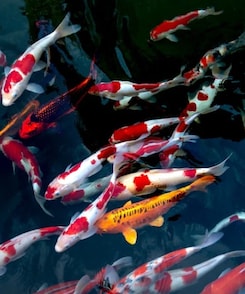Life On Earth
- All
- News
- Videos
- Web Stories
-

How Smart Home Devices Can Help You Celebrate Earth Day Every Day?
- Tuesday April 22, 2025
- Priya Raina
By incorporating smart home devices into your daily life, you can make a positive impact on the environment and celebrate Earth Day every day.
-
 www.ndtvshopping.com
www.ndtvshopping.com
-

1 Trillion Species, 3 Billion Years: AI Helped Trace Bacteria Evolution On Earth
- Friday April 4, 2025
- World News | The Conversation
Bacteria consist of a single cell. They do not have bones and are not like big animals that leave clear signs in the geological record, which thankful palaeontologists can study many millions of years later.
-
 www.ndtv.com
www.ndtv.com
-

"80 Years Of Lies": New Documentary Claims Presence Of Alien Life On Earth
- Wednesday March 19, 2025
- World News | Edited by Bhavya Sukheja
A new documentary is causing a stir by asserting the presence of alien life on Earth and claiming a US government effort to hide information on possible extraterrestrial activity.
-
 www.ndtv.com
www.ndtv.com
-

Microlightning in Water Droplets Could Explain the Origin of Life on Earth
- Tuesday March 18, 2025
- Written by Gadgets 360 Staff
Microlightning, tiny electrical discharges occurring in water droplets from crashing waves or waterfalls, may have played a crucial role in forming organic molecules necessary for life. A study published in Science Advances reveals that these sparks can create carbon-nitrogen bonds, challenging the long-standing Miller-Urey hypothesis. Led by Richa...
-
 www.gadgets360.com
www.gadgets360.com
-

Fossil Evidence Shows Plants Survived the End-Permian Mass Extinction in China
- Tuesday March 18, 2025
- Written by Gadgets 360 Staff
Fossils discovered in China indicate that the End-Permian mass extinction, which wiped out 80% of life on Earth, may not have been as devastating for plants as previously thought. Researchers found evidence of gymnosperm forests and ferns in rock layers from this period, suggesting that some ecosystems remained intact. This discovery challenges ass...
-
 www.gadgets360.com
www.gadgets360.com
-

Life on Mars? Studies Suggest Bacteria-Like Organisms Could Exist
- Thursday March 13, 2025
- Written by Gadgets 360 Staff
New findings indicate that Mars' past conditions may have supported microbial life. Research draws parallels with extremophiles—microorganisms that thrive in extreme environments on Earth. Studies on bacteria like Helicobacter pylori suggest that if life exists on Mars, it might resemble resilient microbes found in human stomachs. Scientists cont...
-
 www.gadgets360.com
www.gadgets360.com
-

Ancient Volcanoes May Have Helped Create Perfect Balance For Life On Earth
- Wednesday March 12, 2025
- World News | Edited by NDTV News Desk
Latest findings suggest that the Earth's atmosphere went through a sequence of oxygenation episodes fueled by geological and biological interactions rather than a single event.
-
 www.ndtv.com
www.ndtv.com
-

Shocking Meteorite Impact Reveals Secrets Of Earth's Ancient Past
- Tuesday March 11, 2025
- Science | Edited by Nikhil Pandey
Scientists have discovered the world's oldest meteorite impact crater in Western Australia, dating back 3.5 billion years, which could provide clues to the early days of life on Earth.
-
 www.ndtv.com
www.ndtv.com
-

Curiosity Rover Finds Evidence of Liquid Water on Mars, Expanding Habitability Timeline
- Tuesday February 18, 2025
- Written by Gadgets 360 Staff
Reports from NASA’s Curiosity rover reveal evidence of ancient liquid water on Mars, challenging previous models. Images from Gale Crater show wave-like ripples, similar to Earth’s lakebeds. Scientists suggest the findings indicate Mars once had a denser atmosphere, which allowed liquid water to exist longer than previously believed. This disco...
-
 www.gadgets360.com
www.gadgets360.com
-

Human-Like Lifeforms Beyond Earth? New Study Says It's More Likely Than We Thought
- Sunday February 16, 2025
- Science | Edited by Ritu Singh
The research proposes that the emergence of humanity on Earth was not as improbable as previously thought, potentially increasing the likelihood of intelligent life existing on other planets.
-
 www.ndtv.com
www.ndtv.com
-

Kidney Bean-Shaped Sand Dunes Spotted On Mars Could Hold Clues To Life
- Wednesday January 15, 2025
- Science | Edited by Abhinav Singh
Unlike the dunes on Earth which are constantly in motion, the kidney bean-shaped dunes on Mars appear surprisingly motionless.
-
 www.ndtv.com
www.ndtv.com
-

Mars Satellite Images Reveal Giant 'Kidney Beans,' Sparking Hints of Water and Life
- Thursday January 16, 2025
- Written by Gadgets 360 Staff
NASA's Mars Reconnaissance Orbiter captured images of frozen sand dunes in Mars' northern hemisphere, revealing unique formations halted by carbon dioxide frost during winter. Unlike Earth's desert dunes, which shift with wind, these Martian dunes remain stationary until spring thaw releases their icy grip. Scientists study these features to unders...
-
 www.gadgets360.com
www.gadgets360.com
-

Mars' Hidden Methane Deposits Could Be Underneath the Crust, Host Alien Life
- Friday January 3, 2025
- Written by Gadgets 360 Staff
Scientists have identified regions on Mars where conditions might support microbial life beneath the surface. Seasonal methane variations and Earth-based studies of similar environments suggest underground habitats such as Acidalia Planitia could hold the key. Methanogens, microbes that produce methane, thrive in extreme conditions on Earth, like s...
-
 www.gadgets360.com
www.gadgets360.com
-

Organic Molecules in Space: A Key to Understanding Life's Cosmic Origins
- Saturday December 28, 2024
- Written by Gadgets 360 Staff
Organic molecules, the building blocks of life, have been discovered across space—from interstellar clouds to asteroids and comets. Findings from missions like Rosetta, Hayabusa2, and Osiris-Rex reveal that these compounds existed long before the Sun formed. Scientists believe organic molecules survived planetary formation in protoplanetary disks...
-
 www.gadgets360.com
www.gadgets360.com
-

How Smart Home Devices Can Help You Celebrate Earth Day Every Day?
- Tuesday April 22, 2025
- Priya Raina
By incorporating smart home devices into your daily life, you can make a positive impact on the environment and celebrate Earth Day every day.
-
 www.ndtvshopping.com
www.ndtvshopping.com
-

1 Trillion Species, 3 Billion Years: AI Helped Trace Bacteria Evolution On Earth
- Friday April 4, 2025
- World News | The Conversation
Bacteria consist of a single cell. They do not have bones and are not like big animals that leave clear signs in the geological record, which thankful palaeontologists can study many millions of years later.
-
 www.ndtv.com
www.ndtv.com
-

"80 Years Of Lies": New Documentary Claims Presence Of Alien Life On Earth
- Wednesday March 19, 2025
- World News | Edited by Bhavya Sukheja
A new documentary is causing a stir by asserting the presence of alien life on Earth and claiming a US government effort to hide information on possible extraterrestrial activity.
-
 www.ndtv.com
www.ndtv.com
-

Microlightning in Water Droplets Could Explain the Origin of Life on Earth
- Tuesday March 18, 2025
- Written by Gadgets 360 Staff
Microlightning, tiny electrical discharges occurring in water droplets from crashing waves or waterfalls, may have played a crucial role in forming organic molecules necessary for life. A study published in Science Advances reveals that these sparks can create carbon-nitrogen bonds, challenging the long-standing Miller-Urey hypothesis. Led by Richa...
-
 www.gadgets360.com
www.gadgets360.com
-

Fossil Evidence Shows Plants Survived the End-Permian Mass Extinction in China
- Tuesday March 18, 2025
- Written by Gadgets 360 Staff
Fossils discovered in China indicate that the End-Permian mass extinction, which wiped out 80% of life on Earth, may not have been as devastating for plants as previously thought. Researchers found evidence of gymnosperm forests and ferns in rock layers from this period, suggesting that some ecosystems remained intact. This discovery challenges ass...
-
 www.gadgets360.com
www.gadgets360.com
-

Life on Mars? Studies Suggest Bacteria-Like Organisms Could Exist
- Thursday March 13, 2025
- Written by Gadgets 360 Staff
New findings indicate that Mars' past conditions may have supported microbial life. Research draws parallels with extremophiles—microorganisms that thrive in extreme environments on Earth. Studies on bacteria like Helicobacter pylori suggest that if life exists on Mars, it might resemble resilient microbes found in human stomachs. Scientists cont...
-
 www.gadgets360.com
www.gadgets360.com
-

Ancient Volcanoes May Have Helped Create Perfect Balance For Life On Earth
- Wednesday March 12, 2025
- World News | Edited by NDTV News Desk
Latest findings suggest that the Earth's atmosphere went through a sequence of oxygenation episodes fueled by geological and biological interactions rather than a single event.
-
 www.ndtv.com
www.ndtv.com
-

Shocking Meteorite Impact Reveals Secrets Of Earth's Ancient Past
- Tuesday March 11, 2025
- Science | Edited by Nikhil Pandey
Scientists have discovered the world's oldest meteorite impact crater in Western Australia, dating back 3.5 billion years, which could provide clues to the early days of life on Earth.
-
 www.ndtv.com
www.ndtv.com
-

Curiosity Rover Finds Evidence of Liquid Water on Mars, Expanding Habitability Timeline
- Tuesday February 18, 2025
- Written by Gadgets 360 Staff
Reports from NASA’s Curiosity rover reveal evidence of ancient liquid water on Mars, challenging previous models. Images from Gale Crater show wave-like ripples, similar to Earth’s lakebeds. Scientists suggest the findings indicate Mars once had a denser atmosphere, which allowed liquid water to exist longer than previously believed. This disco...
-
 www.gadgets360.com
www.gadgets360.com
-

Human-Like Lifeforms Beyond Earth? New Study Says It's More Likely Than We Thought
- Sunday February 16, 2025
- Science | Edited by Ritu Singh
The research proposes that the emergence of humanity on Earth was not as improbable as previously thought, potentially increasing the likelihood of intelligent life existing on other planets.
-
 www.ndtv.com
www.ndtv.com
-

Kidney Bean-Shaped Sand Dunes Spotted On Mars Could Hold Clues To Life
- Wednesday January 15, 2025
- Science | Edited by Abhinav Singh
Unlike the dunes on Earth which are constantly in motion, the kidney bean-shaped dunes on Mars appear surprisingly motionless.
-
 www.ndtv.com
www.ndtv.com
-

Mars Satellite Images Reveal Giant 'Kidney Beans,' Sparking Hints of Water and Life
- Thursday January 16, 2025
- Written by Gadgets 360 Staff
NASA's Mars Reconnaissance Orbiter captured images of frozen sand dunes in Mars' northern hemisphere, revealing unique formations halted by carbon dioxide frost during winter. Unlike Earth's desert dunes, which shift with wind, these Martian dunes remain stationary until spring thaw releases their icy grip. Scientists study these features to unders...
-
 www.gadgets360.com
www.gadgets360.com
-

Mars' Hidden Methane Deposits Could Be Underneath the Crust, Host Alien Life
- Friday January 3, 2025
- Written by Gadgets 360 Staff
Scientists have identified regions on Mars where conditions might support microbial life beneath the surface. Seasonal methane variations and Earth-based studies of similar environments suggest underground habitats such as Acidalia Planitia could hold the key. Methanogens, microbes that produce methane, thrive in extreme conditions on Earth, like s...
-
 www.gadgets360.com
www.gadgets360.com
-

Organic Molecules in Space: A Key to Understanding Life's Cosmic Origins
- Saturday December 28, 2024
- Written by Gadgets 360 Staff
Organic molecules, the building blocks of life, have been discovered across space—from interstellar clouds to asteroids and comets. Findings from missions like Rosetta, Hayabusa2, and Osiris-Rex reveal that these compounds existed long before the Sun formed. Scientists believe organic molecules survived planetary formation in protoplanetary disks...
-
 www.gadgets360.com
www.gadgets360.com





